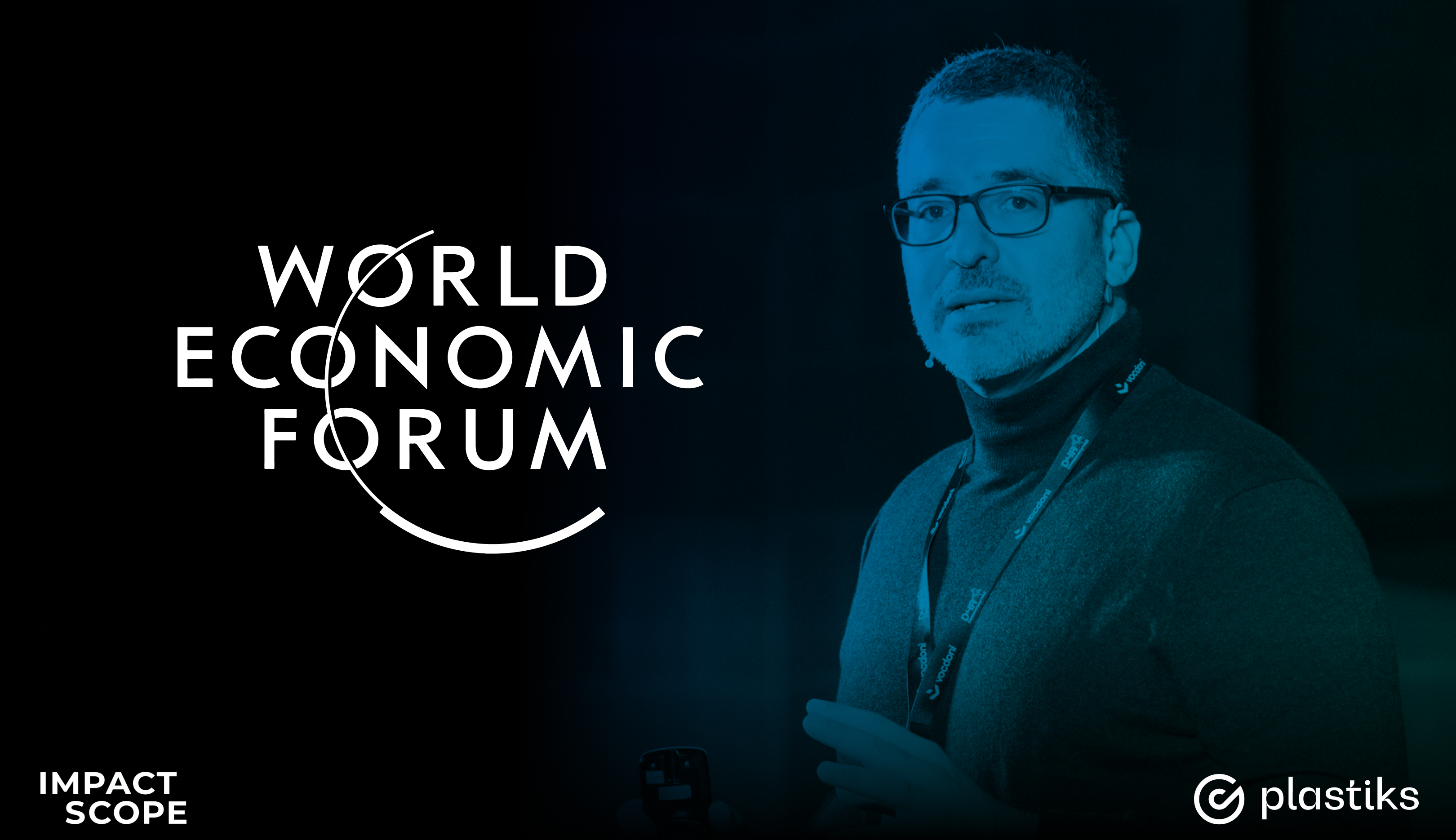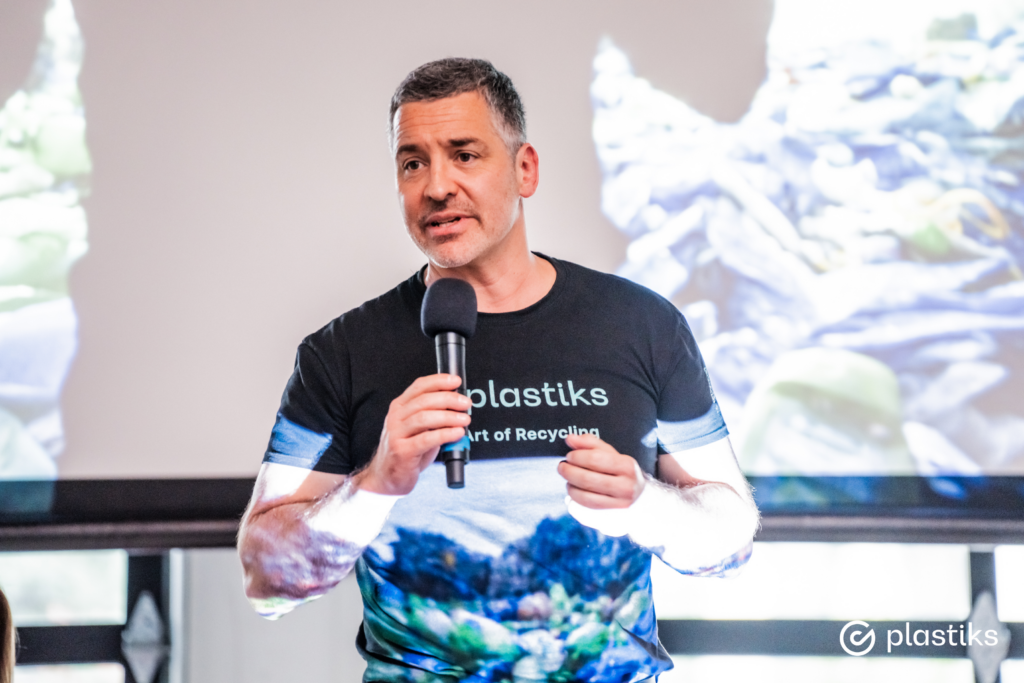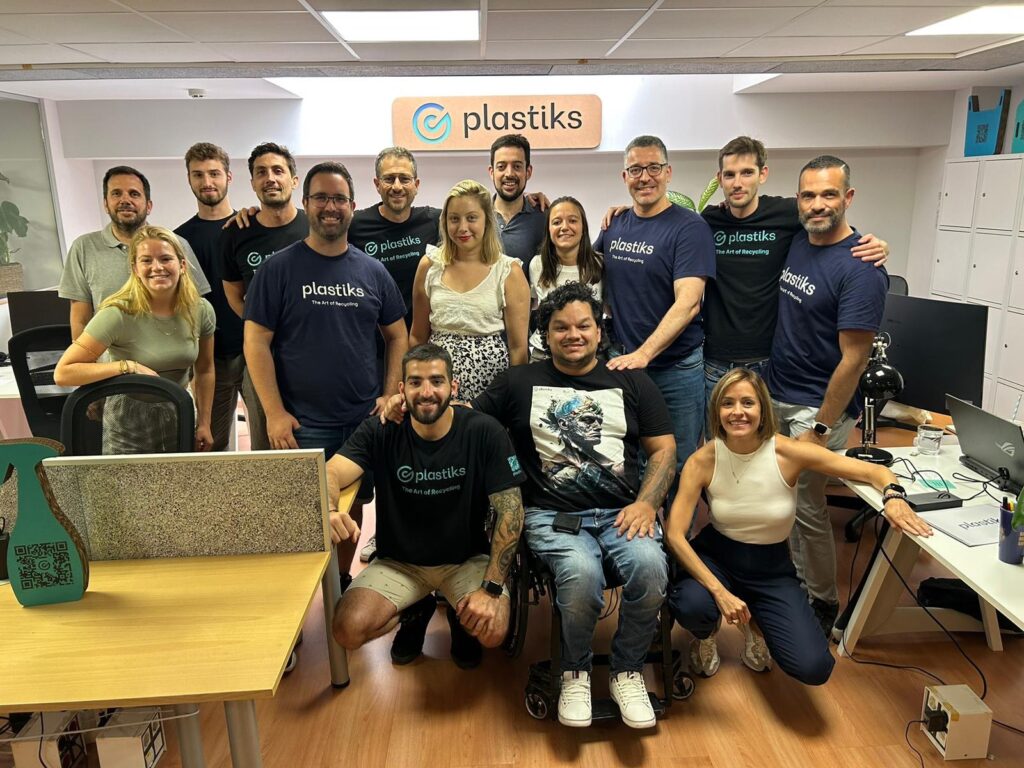Meet André Vanyi-Robin from Plastiks
Q: Can you introduce yourself and your startup, Plastiks?
A: My name is André Vanyi-Robin, the CEO and founder of Plastiks, which is the commercial brand of Nozama, the company that participated in Startupbootcamp in 2021.
Q: What inspired the idea for Plastiks?
A: The concept for Plastiks originated in 2018 during the Amazon forest fires. I pondered on what an ordinary citizen could do to combat climate change. It struck me that most people are preoccupied with daily life – work, family, mortgages, vacations – and the real responsibility lies with companies producing goods and services. These companies should be accountable for their environmental impact. I realized that the true power lies with consumers in choosing products and services based on verifiable environmental impact. This led to the idea of assisting companies in making a positive environmental impact, particularly in waste management.
The waste management industry, stagnant for 50 years, primarily generated business through waste collection, sorting, and selling as feedstock. We saw an opportunity to introduce a third avenue – selling data on waste recovery and delivery to recyclers. This data, in the form of plastic credits, akin to carbon credits, could create new funding sources. These funds could enhance infrastructure and increase plastic recovery. Companies purchasing these plastic credits could immediately impact the environment, bolster their brand, and demonstrate their commitment to environmental sustainability. This concept laid the foundation for our company, and the business model evolved, reaching its final form post-bootcamp.
Choosing Startupbootcamp
Q: How did Startupbootcamp become a part of Plastiks’ journey?
A: We were invited to join Startupbootcamp due to a mandate they received from Mitsubishi Corporation and Mitsui Corporation in Japan. They were seeking climate companies with innovative business models to assist corporations in combating climate change. After a selection process, Plastiks was chosen to participate in the accelerator. We received an investment and embarked on a process focused on identifying strengths and weaknesses, business planning, market research, and business modeling. This lasted several months until we finalized our business model. Our interactions with Mitsubishi Corporation were frequent and instrumental in refining our value proposition based on corporate feedback.
Q: Can you describe the application process for Startupbootcamp? Was it challenging?
A: The application process wasn’t particularly difficult, but it was lengthy. We had to complete numerous applications and undergo a couple of interviews to be selected. There was also an online application component involved in the process.
A Day in the Life at Startupbootcamp
Q: Once accepted, what was a typical day like in Startupbootcamp? Can you describe the program’s structure?
A: The program was structured into four key parts. First, we worked closely with staff members to fine-tune our business plan and value proposition. Second, we attended lectures by mentors and engaged in pitching sessions in front of them. This led to the third part, where mentors selected projects for personal guidance. Finally, there was extensive preparation for pitch day, ensuring we were ready for the demo day after completing the first three stages.
Funding and Equity
Q: Did the program include funding upon admission?
A: Funding was part of the final process. Startupbootcamp does provide investment, but it comes after a certain stage within the program. You’re admitted, then halfway through the program, you receive the funding. By demo day, the aim is to seek additional funding. The funding we received was equity-based; Startupbootcamp took a 1.5% equity stake in Plastiks for an investment of 15,000 euros.
The Accelerator’s Strengths and Areas for Improvement
Q: What was a standout feature of Startupbootcamp that made it especially worthwhile for Plastiks?
A: The most valuable aspect was access to the corporate staff of Mitsubishi Corporation. This opportunity to engage in corporate venturing and explore business processes with Mitsubishi was the main reason we joined the program. The interaction and insights gained from these corporate connections were the program’s standout features.
Q: Was there any aspect of Startupbootcamp that you found underwhelming or didn’t meet your expectations?
A: The major disappointment was the investor turnout on Demo Day. We didn’t have the assurance of facing a significant number of investors, and the turnout was less than expected. This was the primary downside, as it didn’t align with our investment goals. However, the program was highly beneficial in refining our business model and facilitating access to corporate executives, which helped us develop a mature business plan.
Q: How does Startupbootcamp compare to other accelerators you’ve experienced?
A: Comparing Startupbootcamp with other accelerators like Ship2Be in Spain, it stands out as the best among the three we’ve participated in. Although we faced similar challenges with investor access in other accelerators, Startupbootcamp was superior in terms of investment received, corporate connections, and mentorship. They invested €15,000 in us, provided numerous meetings with corporate entities, and offered valuable opportunities for business development. Despite the shortfall in achieving our funding goals at the Demo Day, the overall experience, including the quality of mentors and exercises, made Startupbootcamp the most beneficial accelerator for us.
Plastiks’ Progress Post-Accelerator and the Influence of Startupbootcamp
Q: What is the current status of Plastiks after completing Startupbootcamp, and would you attribute your successes to the program?
A: The company’s journey post-accelerator is a mix of influences. We raised $4 billion a year after the program and have become one of the world’s leading plastic waste recovery tracking platforms. The accelerator in 2021 was beneficial, but our growth in 2022 and 2023 involved evolving and adapting to the market, including raising more funds. While our experiences and contacts from the program have accumulated over time, we can’t say Startupbootcamp directly led us to where we are now.
Q: Has Startupbootcamp expanded your network, particularly in terms of significant contacts?
A: The most notable contact we made through the program was with Mitsubishi Corporation.
Q: What are Plastiks’ next milestones, and how has Startupbootcamp prepared you for these?
A: We’re currently in scaling mode and close to securing significant funding. Our evolution over the past two years since leaving Startupbootcamp has been substantial, so the impact of the accelerator doesn’t directly influence our current stage, as we’re at a different phase in our company’s development.
Q: Did Startupbootcamp introduce you to venture capital firms or angel investors?
A: No, Startupbootcamp did not introduce us to any venture capital firms or angel investors outside of the program.
Q: How has your relationship with Startupbootcamp evolved since completing the program?
A: We maintain regular communication. I spoke to them last week and keep them updated as shareholders of the company. It’s part of my fiduciary duty to inform them of our activities and look out for any potential opportunities.
Founder’s Advice for Startups Considering Accelerators
Q: What advice do you have for startups applying to Startup Bootcamp or any other accelerator?
A: My key advice is to ensure that the accelerator has an investment component. An accelerator without this aspect is not worthwhile. It’s crucial because the investment indicates that the accelerator has a vested interest in your success. Their guidance isn’t just theoretical; it’s tied to their investment in you. This commitment is a clear sign that they believe in your potential and are genuinely invested in your growth.
If an accelerator is willing to invest, it means they are not just seeing you as a customer to meet certain numerical targets, but as a partner in success. Startup Bootcamp stands out because they did invest in us, becoming a shareholder, which showed their commitment to our growth. If an accelerator doesn’t offer investment, it might not be worth your valuable time as a startup. You want them to have ‘skin in the game’; it validates the time and effort you put into the program. Remember, while learning is important, startups need capital, opportunities, and business development support. The best guarantee for positive outcomes is having investors who are genuinely invested in your success.



